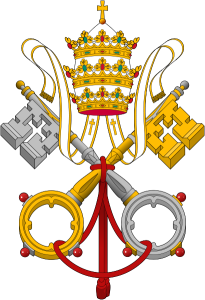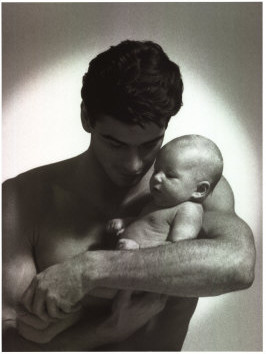Christmas Amazement
“Mary cradled the Creator in her arms. ‘I never imagined God would look like that,’ she says to herself.”
“Mary cradled the Creator in her arms. ‘I never imagined God would look like that,’ she says to herself.”
In that region there were shepherds living in the fields, keeping watch over their flock by night. Then an angel of the Lord stood before them, and the glory of the Lord shone around them, and they were terrified. But the angel said to them, “Do not be afraid; for see—I am bringing you good news of great joy for all the people: to you… Read More »Merry Christmas!
Pictured here is Giovanni Francesco di Bernardone (a.k.a. St. Francis of Assisi, d. 1226 ) – my photo of a 19th c. statue from southern Arizona, probably well worn from processions and general fondling. I understand that he started, or at least popularized the building of manger scenes. I remember reading his early biographies some years ago. I never could decide what to think: whether he… Read More »Merry Christmas
Is it a sin to celebrate Christmas, because Christmas is pagan in origin? In this episode I discuss this disputed question, and what I believe the apostle Paul would have to say about this ongoing dispute between Christians.
Philosophical theologian Randal Rauser has been blogging as the Tentative Apologist. This year, for Christmas, he says he’s hoping for “a coherent account of the incarnation“. In other words, he wants a way of understanding the incarnation doctrine which is apparently consistent. Will he get it? Word has it that the elves are working overtime on this request, as Rauser has been a very good… Read More »Linkage: What Randal wants for Christmas
The scene, an American evangelical church, around Christmas time. The pastor prays, Heavenly Father, than you so much for sending us your Son! We’re so grateful for your perfect of gift of forgiveness, of eternal life. Help us, this season, to remember the reason for it. God, thank you for coming to be born, to die for us. In your name we pray, amen. At… Read More »a present you should return: Christmas confusion
Why no mention of Incarnation in the birth narratives of Matthew and Luke?
Merry Christmas! …unto us, a Son is given, and the government shall be upon his shoulder, and his name shall be called Wonderful, Counselor, the Mighty God, the Everlasting Father, the Prince of Peace. Who was Mary’s first son? Was it God himself, the Father, the Lord God Almighty? Isaiah seems to say so… But appearances can be deceiving. Here are some helpful discussions by… Read More »Unto us a Child is Born
Who was born on the first Christmas? According to Luke, God revealed this information to a Jewish prophet named Simeon: Now there was a man in Jerusalem whose name was Simeon; this man was righteous and devout, looking forward to the consolation of Israel, and the Holy Spirit rested on him. It had been revealed to him by the Holy Spirit that he would not see… Read More »Simeon says…
Dr. Bob Cargill of the University of Iowa reviews The Lost Gospel by Simcha Jacobovici and Barrie Wilson. In his view, it’s a stink-bomb of a Christmas present. In part (emphases added) Just don’t bother. Were it a Dan Brown-esque novel, positing a speculative interpretation about the relationship between Jesus and Mary Magdalene utilizing a fanciful allegorical interpretation of a document written six centuries after Jesus… Read More »The Lost Gospel – Not Lost, and Not a Gospel!
This reply of his, honestly, is too danged long, as is this series. Future critiquers – remember, brevity is the soul of wit. But here is part 4 of 5. I’m going to skip a few tangents. Picking up his critique, …irrespective of whether the doctrine of the Trinity is true, it’s not formally contradictory. Depends on the version, but my post doesn’t anywhere claim that… Read More »On a Rebuttal to my “How Trinity theories conflict with the New Testament” – Part 4

First, a few clarifications. By “modalist” I do not mean “Sabellian” or “monarchian.” (Those ancient catholics probably did hold to various forms of modalism, but the term is not a historical one, and can refer to other views which probably no ancient person held.) Nor do I mean modalism by definition to be heretical relative to orthodox/catholic creeds. What I mean is that at least one of these – Father, Son, Spirit – is a mode of the one God, in some sense a way that God is. That last phrase is deliberately ambiguous.
In his recent Christmas sermon the Pope said:
In all three Christmas Masses, the liturgy quotes a passage from the Prophet Isaiah, which describes the epiphany that took place at Christmas in greater detail: “A child is born for us, a son given to us and dominion is laid on his shoulders; and this is the name they give him: Wonder-Counsellor, Mighty-God, Eternal-Father, Prince-of-Peace. Wide is his dominion in a peace that has no end” (Is 9:5f.). … A child, in all its weakness, is Mighty God. A child, in all its neediness and dependence, is Eternal Father. …
God has appeared – as a child. It is in this guise that he pits himself against all violence and brings a message that is peace. (emphases and link added)
This last phrase, X has appeared as S, is ambiguous. It could mean Read More »Is the Pope a Modalist?
In this episode, my evaluation of the case made by Shadid Lewis. Does he establish, on grounds which his opponent must affirm, that the Trinity implies polytheism? See Lewis’s arguments as analysed on the post for episode 17. What is the doctrine of the Trinity anyway? Are the persons members of an eternal group of wonderfully unified friends? Or are they aspects or personalities of… Read More »podcast 21 – review of the Lewis-Rogers debate – part 2
Two philosophers give us a sort of recipe for answering this question.
Christmas time! So time to sell magazines (etc.) with sensational, poorly reasoned articles which attempt to be bold and provocative. It’s as predictable as the rising sun. No book is evidence, right? Right. Else we’d be able to prove the reality of Batman by citing a comic book. [Facepalm] This argument kills with 8th-graders. But any adults should be unimpressed. I’ll wager that any adult can think… Read More »no, Jesus is not a fictional character

My other blog gig is as the Theist on Objectivist v. Constructivist v. Theist. This blog was begun to post the newspaper columns (in our local paper) in which my collegues Bruce Simon (liberal, aka “Constructivist”) and Steve Kershnar (libertarian, aka “Objectivist”) debated points of politics and morality. When Bruce no longer had the time, I stepped in as the Theist, and debated Steve mostly on moral and religious questions in a series of sort of debate style opinion columns. Steve is a good friend and colleague, and we’ve frequently butted heads on all sorts of things since I was hired at Fredonia in 2000. He’s sharp, well-read, funny, and has a winning personality. To say he’s well-published would be an understatement – see his whopper c.v. He’s written on many questions of justice, public policy, ethics, and philosophy of religion. His work is original, rigorous, and informed by relevant empirical research. In addition his his philosophy PhD (he’s a proud, proud Cornhusker) he holds a law degree from Penn. In his inimitable trouble-making style, he decided to write a column on the Trinity leading up to Christmas, which we’re please to cross-post from here. – Dale
THE MYSTERY OF THE TRINITY
The Objectivist [Steve Kershnar]
Dunkirk-Fredonia Observer
December 21, 2008
Did Isaiah predict that someday God would become a baby?
Dr. Lee Irons on his contribution to the new book The Son: Three Views of the Identity of Jesus, interview by Dr. Dale Tuggy for episode 117 of the trinities podcast.
Thanks to Rob Bowman for his thoughtful reply to my previous post regarding the Shema and his argument with Sir Anthony Buzzard. While I sided with Mr. Bowman regarding the meaning of the Shema (as saying that YHWH is unique – who which only presupposes, but doesn’t assert that he is a god), I think Buzzard is correct that ancient Jews thought that YHWH was… Read More »a reply to Robert Bowman on biblical monotheism, the Trinity, and the Shema

Last Christmas season I posted in a slightly Grinch-like way about catholic Incarnation theories, and about some Christians’ lack of critical thinking about them.
There’s an interesting human impulse observable here. The best analogy I can think of right now is posters like the one to the left. The ladies love them.
Why? There’s the sex appeal of the dude. And the cute baby. Everyone likes a cute baby.
But there’s something else, something affecting about a big, strong, tough manly man, stooping to gently cradle a teeny, vulnerable baby. He’s made himself so vulnerable. Of course, that adds to the “sexy” part. My point is, the affecting nature of the man’s condescension is a distinct element of the appeal.
Now imagine that God, big strong God, becomes an ignorant, weak, dependent little baby. There’s a similar, recognizable emotional tug there. What an amazing idea! Of course, it may be amazing in part because it’s contradictory. But I’ll not argue that here.
Instead, a bit of cross-cultural comparison. Christians aren’t the only ones who go in for the idea of a god who comes down from his mighty position, to be a cute, puny little baby.
The Ramayana is an epic poem, and a sort of scripture in Hinduism. Parts of it go back perhaps to the 400s BCE, though it comes in many versions, some of which are from the high middle ages. The clip below is from a wildly popular Indian television series from 1986 called Ramayan. If you’re interested in Hinduism, I recommend it, but it’s a real time commitment to watch the whole thing. I’ve edited some bits of it, to include the more theological parts, and to get it down to youtube length. It’s here, Ram or Rama, is supposed to be an avatar of the god Vishnu.
My point is notRead More »God the baby – Rama / Ram, avatar of Vishnu